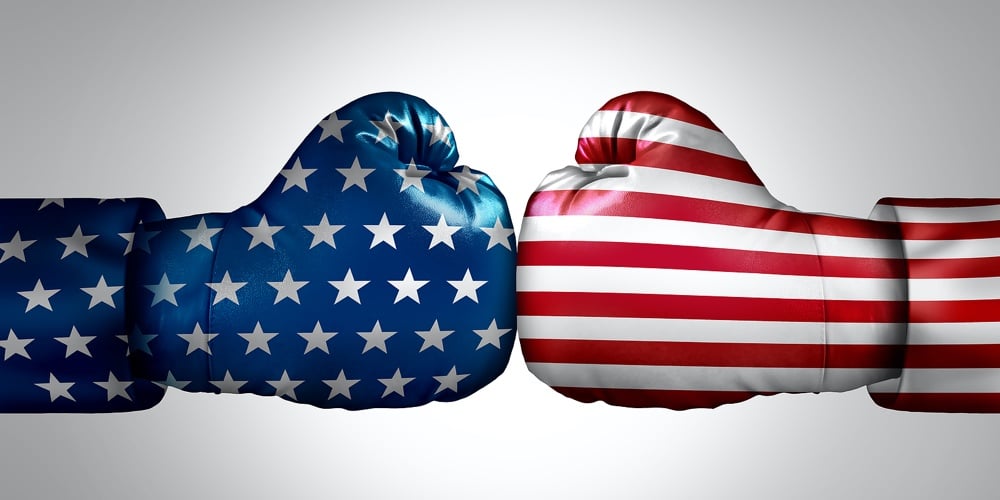Everybody wants inclusion … so why are we so polarized?

As we watch the dust settle on the 2020 Presidential election, I am hyperaware of the extreme polarization that exists in America and in our workplaces.
Over the past eight months, I have studied and written on the impact of Covid-19 on inclusive workplaces. It involved looking at the necessity of credit unions to provide remote work options, acknowledging the need for managers to be intentionally inclusive during uncertain times, and exploring how Covid might impact women’s professional gains and what employers could do to help.
As the year has stretched on, my research and work with clients has piqued my curiosity even further about an increasing sense of polarization and the realization that the workplace is not free from this division—despite so much recent attention on Diversity, Equity, and Inclusion.
Just looking at one current event—the Presidential election—the potential for division in the workplace is apparent. A 2019 study from the Society of Human Resources Management found that 42% of respondents personally experienced political disagreements in the workplace, and over one-third do not feel their workplace is inclusive of differing political perspectives. If we are hoping this gets better after the election, we might learn from 2016: An American Psychological Association survey showed that after that election, American workers experiencing negative outcomes related to discussing politics at work rose from 27% to 40%, reporting issues like reduced productivity and increased hostility.
Why—despite increased awareness of the value of inclusion and understanding others—are we still so polarized? And, many of you may be asking, why must organizations shoulder the burden of helping people overcome this division? Possibly, the answer lies in the necessity of building trust in the workplace.
As humans, we have evolved to survive; however, most of the time the target audience of my writing—organizational leaders—are more likely focused on thriving rather than surviving. Day-to-day, there are few fight-or-flight triggers and very little need to be surrounded by a tribe of likeminded individuals keen on preserving our way of life.
At least it was that way until a global pandemic pushed the population into a survivalist mode and a scarcity mindset. In March 2020, the world became very dangerous. Others’ decisions and attitudes threatened lives and livelihoods. There was scarcity—of protective equipment, of toilet paper, of food, and of time as people attended to work and remote learning and emergency preparedness. In a place of scarcity, people become defensive, working to protect themselves, their families, and their way of life.
When their ideas for protection are threatened by other ways of thinking that contradict their carefully crafted survival strategies, the response is defensive. It drives a strong sense of us vs. them thinking, defining the other as a dangerous threat.
This idea of the “other” has been a long-standing obstacle to inclusion. Understanding the “other” (and the reality that to someone, each one of us is the “other”) is a key reason that effective workplace DEI integration strategies start with work that expands personal awareness of what has shaped individuals. Today, rather than understand the “other,” many people are able to simply avoid the threats of “others,” though. There is no need to engage in meaningful conversations with people who think differently than us. We unfriend, unfollow, or change social media platforms if we don’t like what we are hearing. We find another news outlet, another church, another friend if our beliefs aren’t confirmed. This year, especially, interactions have been limited due to Stay Safe Stay Home orders and other elements of social distance. When you add this shrinking world to an on-demand media menu, people live more tribally than they have in generations, intentionally surrounding themselves only with those who support their personal beliefs, avoiding interactions with those who threaten their ideals.
Until they go to work.
The workplace may be one of the last places in the country where people are required to interact meaningfully with people who might not share their own perspectives. At work, 100 Million Americans are engaging with one another without the option of unfriending or unfollowing if values do not align.
The workplace requires a sophistication of communication that is honest, respectful, and learning-focused. An environment that encourages political correctness or assimilation—instruction to employees to “go along to get along”– will not help your organization arrive at a place of authentic inclusion. It will not build trust and candor that results in better innovation, collaboration, and service to members. At work, employees must overcome their tribal instincts and collaborate with people who have different perspectives, ideas, and frames of reference.
As a leader or DEI Champion in these times of fear, uncertainty, and scarcity, this is what you are up against. You may find yourself trying to expand trust in a workplace where your team members’ instincts are telling them to protect and preserve their own survival. As you work to build an inclusive workplace where people can come together and listen to different perspectives, you must first create a sense of safety that allows people to lower their defenses.
Understanding the scarcity mindset many people are in right now makes it more important than ever to do the work, dedicating the time and energy and attention to persistently and consistently creating a place where your team members receive the message that they are safe, that they are valued, and that your interest in inclusion is authentic and for everyone.
If your organization is working to build a culture of trust, I recommend the resource, “Safe Enough to Soar: Accelerating Trust, Inclusion, and Collaboration in the Workplace.” It is a great starting point for any leadership team to assess their organizational readiness, and to serve as a foundational guide for organizations ready to dig into the work of creating inclusion. If you would benefit from support in moving your organization to a place of inclusion, Humanidei is here to help.

